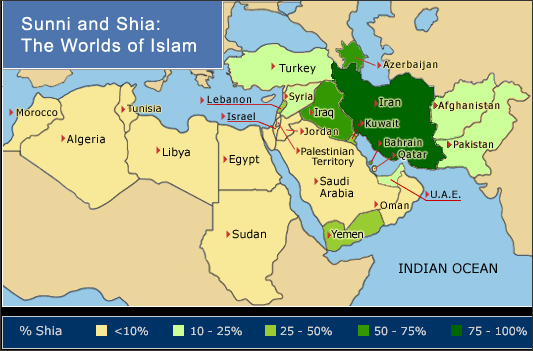.
The Redirection, Is the Strategic Shift in US Policy Benefitting Our Enemies by Seymour Hersh
(The New Yorker) March 5, 2007 – To undermine Iran, which is predominantly Shiite, the Bush Administration has decided, in effect, to reconfigure its priorities in the Middle East. In Lebanon, the Administration has coöperated with Saudi Arabia’s government, which is Sunni, in clandestine operations [Hariri assassination? – Oui] that are intended to weaken Hezbollah, the Shiite organization that is backed by Iran. The U.S. has also taken part in clandestine operations aimed at Iran and its ally Syria. A by-product of these activities has been the bolstering of Sunni extremist groups that espouse a militant vision of Islam and are hostile to America and sympathetic to Al Qaeda.
One contradictory aspect of the new strategy is that, in Iraq, most of the insurgent violence directed at the American military has come from Sunni forces, and not from Shiites. But, from the Administration’s perspective, the most profound–and unintended–strategic consequence of the Iraq war is the empowerment of Iran.
Saudi Arabia, Israel, and the United States Are Behind Syria’s Violence [also Turkey and GCC states– Oui]
In retrospect we see just how devastatingly accurate Hersh’s reporting was. It is clear now, with the rise of the Muslim Brotherhood and the sectarian-extremist dominated, foreign-funded destabilization ravaging Syria, that this policy created during the Bush administration, has transcended presidencies and is being brought to its premeditated conclusion under Obama – yet another example of “continuity of agenda.”
The evidence trickling out of the corporate-media regarding who the armed Syrian opposition is, reveals that it is predominately an extremist sectarian-movement, not only including Syrian extremists, but militants crossing the border from Iraq, Jordan, Lebanon, and even from as far as Libya. An alliance of Gulf States led by Saudi Arabia have pledged funds for Syria’s militants and has repeatedly called for openly arming them. The US is likewise openly equipping Syrian militants.
GCC Lashes Out at Iran, Calls for Transition in Syria
(INN) Dec. 26, 2012 – Concluding a two-day summit in Manama, the Gulf Cooperation Council members voiced support for Bahrain’s Sunni minority regime while lashing out at Tehran, which they accuse of fueling a Shiite-led uprising in the host country last year. In a joint statement, the GCC countries said they “reject and denounce” Iran’s “continued interference” in their internal affairs.
Continued below the fold with speeches Obama administration (VIDEO) …
(New Yorker) Feb. 3, 2010 – I [Seymour Hersh] spoke to Bashar Assad, the president of Syria, this winter in Damascus. Assad assumed the presidency after his father’s death, in 2000, when he was thirty-four years old, and he expressed some empathy for President Barack Obama, who, like Assad, was confronted with a steep learning curve.
A senior Syrian official had told me that, last year, Syria, which is on the State Department’s list of state sponsors of terrorism, had renewed its sharing of intelligence on terrorism with the C.I.A. and with Britain’s MI6, after a request from Obama that was relayed by George Mitchell, the President’s envoy for the Middle East.
Hillary Clinton:
The press conference of Hillary with [Israeli Prime Minister Benjamin] Netanyahu [in which she appeared to walk away from the Administration’s call for a freeze on settlements] was very bad, even for the image of the United States.
Israel and the United States:
To be biased and side with the Israelis, this is traditional for the United States; we do not expect them to be in the middle soon. So we can deal with this issue, and we can find a way if you want to talk about the peace process. But the vision does not seem to be clear on the U.S. side as to what they really want to happen in the Middle East.
Israel’s continued settlement expansion (April 2009)
Obama:”Time To Move Forward” With Israeli-Palestinian Peace (Sept. 22, 2009)
Statements by Secretary Clinton and PM Netanyahu (Oct. 31, 2009)
Clinton faces Arab backlash after praising Israeli settlement ‘restraint’
- Netanyahu kicks balls away by announcing settlement restraint
- Where’s Hillary? Can’t she stomach the Libyan and Syrian issue?





